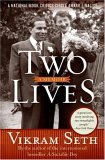Summary | Excerpt | Reading Guide | Reviews | Beyond the Book | Readalikes | Genres & Themes | Author Bio

1.1
When I was seventeen I went to live with my great-uncle and
great-aunt
in England. He was Indian by origin, she German. They were
both sixty. I hardly knew them at the time.
It was August 1969 – the monsoon season in Calcutta. A few
days before I left, Mama had taken me to a temple to be blessed,
which was most unlike her. She and Papa came to see me off at
Dumdum Airport. I arrived at Heathrow in the afternoon. My
great-uncle and great-aunt were still away on their annual
holiday
in Switzerland and, as I recall, I was met at the terminal by
someone
in the firm for which my father worked. My first impression
was of the width of the road that led (under grey skies) to
London.
I was housed for a night in a drab hotel somewhere near Green
Park.
That evening Shanti Uncle and Aunty Henny returned from
Switzerland, and the following day I and my luggage arrived at
their door.
I looked at the house that was to be my home for the next few
years. There was a red pillar-box not far from the gate of 18
Queens Road, Hendon; this was to be my beacon whenever I
trudged up from the tube station. In front of the house was a
small, low-walled, immaculately maintained garden with a few
rosebushes in full bloom. A path led to the door. To the right
of
the path, slanted on a stand, was a burnished brass plaque that
read:
S. B. Seth
L.D.S., R.C.S. (Edin.), B.Sc., D.M.D. (Berlin)
Dental Surgeon
I set down my luggage on the front step. The thought of meeting
people whom I had not seen for years and did not really know,
and
whose home I would be sharing, made me nervous. I was, in any
case, fearfully shy. After a minute I rang the bell.
Aunty Henny appeared. Lean, tall, sharp-featured and attractive,
she didn't look sixty. She greeted me with enthusiasm rather
than
warmth, and led me down the linoleum-floored hallway where
three or four people were seated, browsing through old
magazines. 'Shanti's patients,' she explained. She poked her head into the
surgery
to exclaim in her high voice, 'Shanti, Vicky is here,' before
opening the door to the drawing-room. 'No, leave the luggage in
the corridor, by the stairs,' said Aunty Henny. 'Now sit down and I shall make
some tea.'
Since I had been told by Mama not to give any trouble and to be
helpful at all times, I offered to help. Aunty Henny would have
none of it. I sat down and surveyed the room. Everything seemed
inordinately tidy, down to the nested set of varnished
side-tables
and a polished cabinet for the television.
Aunty Henny brought tea with three cups, and soon afterwards
Shanti Uncle took a break from his work. He was still dressed in
his white dental jacket. As soon as he came in, he hugged me,
then
stood back and said, 'Now let me look at my little Vicky. It has
been so many years since I saw you. Now you must tell me how
your parents are, and what your journey was like. Have you got
all
your kit for school? Have you eaten? Henny, the boy's starving,
you can tell. We must feed him up. Let's open a tin of peanuts.
Have you shown him his room?' Aunty Henny looked on impatiently.
Suddenly Uncle glanced at his watch, gulped his tea down
and rushed back to the surgery.
In those days I was very sensitive about my height and cringed
whenever anyone called me little. Shanti Uncle, however, was
even
shorter than I was, and Aunty Henny towered over him. Nor did I
like being called Vicky, even though in India it would not be
taken
for a feminine diminutive. But my overwhelming sense was that of
relief. Uncle's talk filled in, indeed flooded, all my awkward
silences. And his hug had made me feel welcome, though it was
made with only one arm. His right arm, being artificial, was
withheld
from the embrace.
Visit HarperCollins.com for more information about Two Lives by Vikram Seth. The foregoing is excerpted from Two Lives by Vikram Seth. All rights reserved. No part of this book may be used or reproduced without written permission from HarperCollins Publishers, 10 East 53rd Street, New York, NY 10022.
Your guide toexceptional books
BookBrowse seeks out and recommends the best in contemporary fiction and nonfiction—books that not only engage and entertain but also deepen our understanding of ourselves and the world around us.